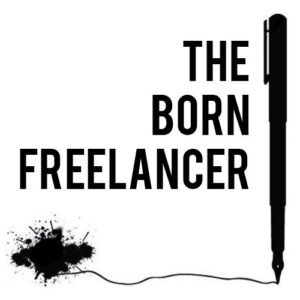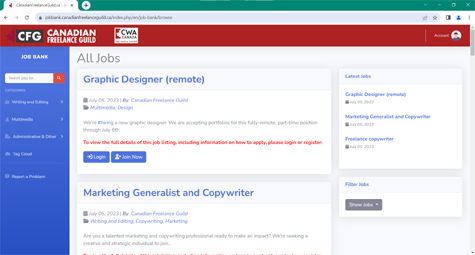This series of posts by the Born Freelancer shares personal experiences and thoughts on issues relevant to freelancers. Have something to add to the conversation? We’d love to hear from you in the comments.

One of the best pieces of advice I ever received when I was starting out as a rookie freelancer came from a veteran writer and broadcaster, a distinguished older colleague who had served with distinction in the military. We spoke briefly, only once.
Being young and inexperienced I didn't understand it right away. Indeed I don't remember even asking for advice, being so young and inexperienced I didn't know I could or that I should.
I was interviewing him about his wartime experiences. Then I made some flippant remark about how freelance writing and broadcasting required a different set of skills to survive.
He paused, considering my question with greater solemnity than I had expected (or deserved). He replied that on the contrary, many of the lessons he had learned in wartime were still relevant. By way of illustration, he quoted an old military axiom, perhaps the only one ever to lodge unbidden in my brain:
"Time spent in reconnaissance is seldom wasted."
The arcane words meant nothing to me. Doubtlessly, I pressed on for additional wartime anecdotes, oblivious to the gift of gold he had laid before me.
Fast forward several months
I was freelancing at a small radio station, filling in as summer host of the 9 to 12 noon phone-in show on an otherwise all music station.
The host I temporarily replaced was an entertainer and not a journalist. So the mandate was to keep the show light-weight and entertaining. The local audience seemed to prefer it.
The show ran like a well-oiled engine. I somehow managed to fit in. I don't remember specific topics but the producer (and board operator) used only proven successes. Swap shop, trivia games, that kind of thing.
The biggest successes were the fraudulent fortune tellers who were allowed to blight the airwaves everywhere in those days with little critical opposition. Any ethical qualms I expressed were always quashed by the producer. It was just fun, nobody took it seriously - and, his clinching argument, the lines were always full.
So I was coasting along, lulled into a gentle summer inertia, when the producer announced (on a Friday) that on Monday we would do something "different."
At last! A chance to do something "serious."
There was a major humanitarian crisis elsewhere on the planet. The Monday show would be devoted to it, commercial-free. My guests would be local aid workers just back from the affected region.
"It will touch their hearts" assured my producer, "they will be calling in droves!" When I asked what special prep I should do, he suggested reading the papers. And that was that.
Except those arcane words now echoed in my brain:
"Time spent in reconnaissance is seldom wasted."
I went into action. I spent much of that weekend in the library, looking up everything about the crisis region that might be relevant. (This was before the internet was ubiquitous.)
History. Geography. Economics. Anything that might relate. Why? I wanted the show to be good, sure, but there was Another Reason. But what that was I wouldn't find out until Monday.
Fast forward to Monday mid-morning
The show is proceeding smoothly. My guests are well-spoken, and I've allotted the first half hour to ask my questions. I figure the remaining two and a half hours will be listeners calling in to ask questions and express heartfelt admiration for their hometown team's work.
9:20 am. I look into the control room. My producer (behind the glass) is gesticulating towards the phones. I look. The lines are empty. Nobody is calling. No problem, I am thinking to myself as I hear myself asking my probing questions aloud, they are listening to our conversation. I will prompt their calls at the bottom of the hour.
9:30 am. I invite listeners to call. Crickets. No callers. OK. No problem. I will continue my questions and ramp up the invitations to call. I hope my guests do not detect the burning seed of anxiety growing in my belly.
My first break was for the hourly news at the top of the hour.
10 am. News. I excuse myself from the studio and my guests to hastily confer with my producer in the hallway. There have been zero calls. My producer is in shock. He can't understand it. This has never happened before. His only direction - he will phone and pretend to be a listener. Also - dumping such an important (and highly promoted) topic was out of the question.
So there were two hours to go with no callers (and none seemed likely). On a phone-in show.
There is something about crisis that focuses your mind. I didn't have time to panic. What ran through my mind was this:
"Time spent in reconnaissance is seldom wasted."
I had somehow known to prepare for this moment. I had done my "reconnaissance" - my research, and I had extensive notes. I had excellent guests and a worthy topic. Well armed with this knowledge, I took a deep breath and went back into the studio...
Somehow we did the remaining two hours without any callers (well, any genuine ones.) In effect, I had turned a phone-in into an in-depth free-flowing conversation. Of course, I had had little choice.
Emerging at high noon, my guests (none the wiser about the behind-the-scenes drama) were triumphant and exhilarated. They'd never before had an opportunity for such an in-depth and detailed but laid back interview. ("Take me through a typical day in the village, hour by hour, let's start when you awaken...") They felt sure it could only do their cause great good and were very grateful for the opportunity.
My producer still seemed dazed and in shock, muttering about it being the wrong time of year for serious topics and that from now on he'd book "psychics" and trivia games.
A colleague later said she would have called but it had been such an incisive conversation that she was content just to listen.
The takeaway
For me, I had survived three hours that had transformed into a learning experience I could not have foreseen nor would ever want to forget.
I lay on the grass in the park opposite the station on that sunny summer's day all those years ago, exhausted, my clothes drenched in sweat.
But at last I understood the meaning and value of those arcane words. Words of advice I would embrace for the rest of my life, whenever I could:
"Time spent in reconnaissance is seldom wasted."




